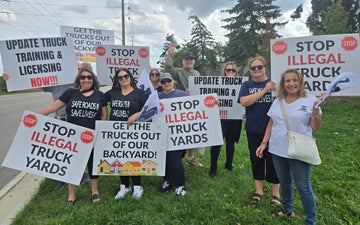Canada’s tax agency may be the key to driving dangerous truck operators off Peel's roads

The Canada Revenue Agency could solve the dangerous trucking problem in Peel Region overnight if it enforced laws for contractors and underground economies
MISSISSAUGA, Oct. 22, 2025 – Unsafe truck drivers and companies will continue to operate on Peel Region's roads if existing tax laws are not enforced by the Canada Revenue Agency (CRA), some industry experts say.
This perspective comes against the backdrop of recent demonstrations by a road safety advocacy group in Caledon, where some crashes involving tractor trailers in recent years have been blamed on inexperienced or poorly trained truck drivers.
The Ontario Ministry of Transportation recently suspended 185 commercial trucking licences it believes were fraudulently obtained — a move seen by some as too little too late.
“We have zero tolerance for bad actors on our roads and have suspended the Class A commercial driver’s licences of individuals who we believe to have obtained them dishonestly during the Class A testing and/or training process,” Minister of Transportation Prabmeet Sarkaria’s office said in an email.
Neither the minister nor his office responded to direct questions about the impact of this licensing crackdown, illegal truck yards, specific issues in the trucking industry, the government’s handling of those issues and a plan to address public safety concerns.
“I have to say that our trucking problems could be solved overnight … could be solved right now if the Canada Revenue Agency enforces the laws already on the books,” said Marco Beghetto, vice-president of communications and spokesperson for both the Ontario Trucking Association and the Canadian Trucking Alliance.
Beghetto is talking about CRA rules governing how businesses are classified in Canada — noting many truck drivers are classified as contractors.
“This means truck drivers get lost in the system as they are not (mandated) to provide T4As that the CRA needs to compute their incomes. It also means that the CRA has no way of determining the number of people on a company’s payroll when an employer reports their wages to the agency,” he explained.
These “loopholes” are fertile ground for what the Canadian Trucking Alliance calls Driver Inc. — unscrupulous trucking operators that thrive in an underground economy where taxes are evaded while circumventing labour laws and safety standards.
Jagdeep Shipra, president and owner of trucking industry consulting company 5K Solutions and Services in Brampton, concurs with critics in this respect, but cautions about painting everyone in the trucking business with the same brush.
“We must be mindful of treating everyone and every business the same in the province and in the country. Don’t just pick on the trucking industry. We all can do better,” he said.
Shipra insisted the federal government must ensure all businesses are in compliance, follow worker classification rules and make T4As mandatory for all contractors.
“Make it mandatory for every industry to be compliant, not just the trucking companies or operators,” he maintained.
Shipra, who has been in the trucking industry for 14 years, was born in Kenya and moved to Canada more than 26 years ago. He is particularly troubled by what he considers xenophobia among some of the people and groups attacking the trucking industry, which employs many new immigrants.
“It’s easy to pick on minorities and immigrants — minorities are often easy targets in any society,” Shipra said, adding it is the Ministry of Transportation issuing licences and certifying drivers as qualified.
“The ministry must re-examine the root causes of the problems in trucking, and they must be bold in making up their mind on treating all businesses and industries fairly.”
For her part, Amanda Corbett, a member of the Caledon Community Road Safety Advocacy Group (CCRSA), said her organization is not xenophobic and finds any suggestion to the contrary offensive.
“We don’t care the race or colour of the driver who is involved in trucking violations — what we care about is the safety of our community,” she said, while admitting that there are some detractors of the trucking industry who are hateful of minorities and new immigrants.
There are people whose comments “we don’t approve, and they leave posts on our social media site,” she explained.
“We cannot control everyone who leaves hateful comments. That’s the nature of social media,” Corbett said. “That’s the world we live in today. I am sorry.”
As an advocacy group, CCRSA is sympathetic to newcomer truck drivers who are being abused by the companies that brought them to Canada under the guise of the Temporary Foreign Worker Program, said Corbett.
Corbett agreed the CRA should get involved if that would help stave off bad actors from getting into the trucking industry.
“We just want solutions now because people are dying needlessly on our roads.”
Franca Pisani, another CCRSA member, said problems in the trucking industry are multidimensional, be it issues involving minimum wage, the environment, physical safety, organized crime or immigration.
Some CCRSA members believe some trucking operators abuse Canada’s Temporary Foreign Worker Program, with its agricultural component, as a loophole to bring in immigrant truck drivers who are converted overnight to a new form of business without the necessary experience.
“But that’s also due to a flawed immigration system in Canada,” said Shipra, adding many newcomers have post-secondary degrees they cannot use in Canada, so they resort to trucking.
Neither the CRA nor Peel Region politicians at the federal and provincial levels responded to multiple requests for comment about the role the CRA should play in addressing concerns raised by trucking safety advocates and industry insiders.
Peter Uduehi is a Local Journalism Initiative reporter at Mississauga.com.







(0) Comments